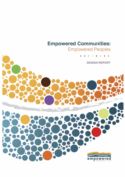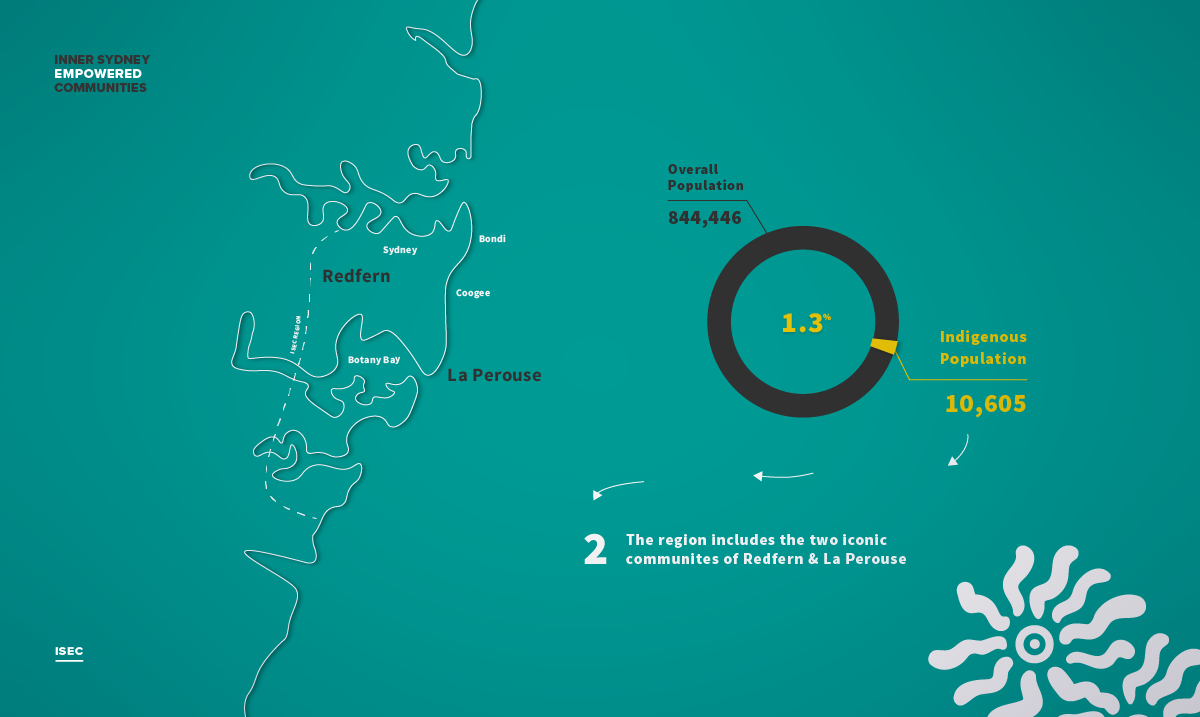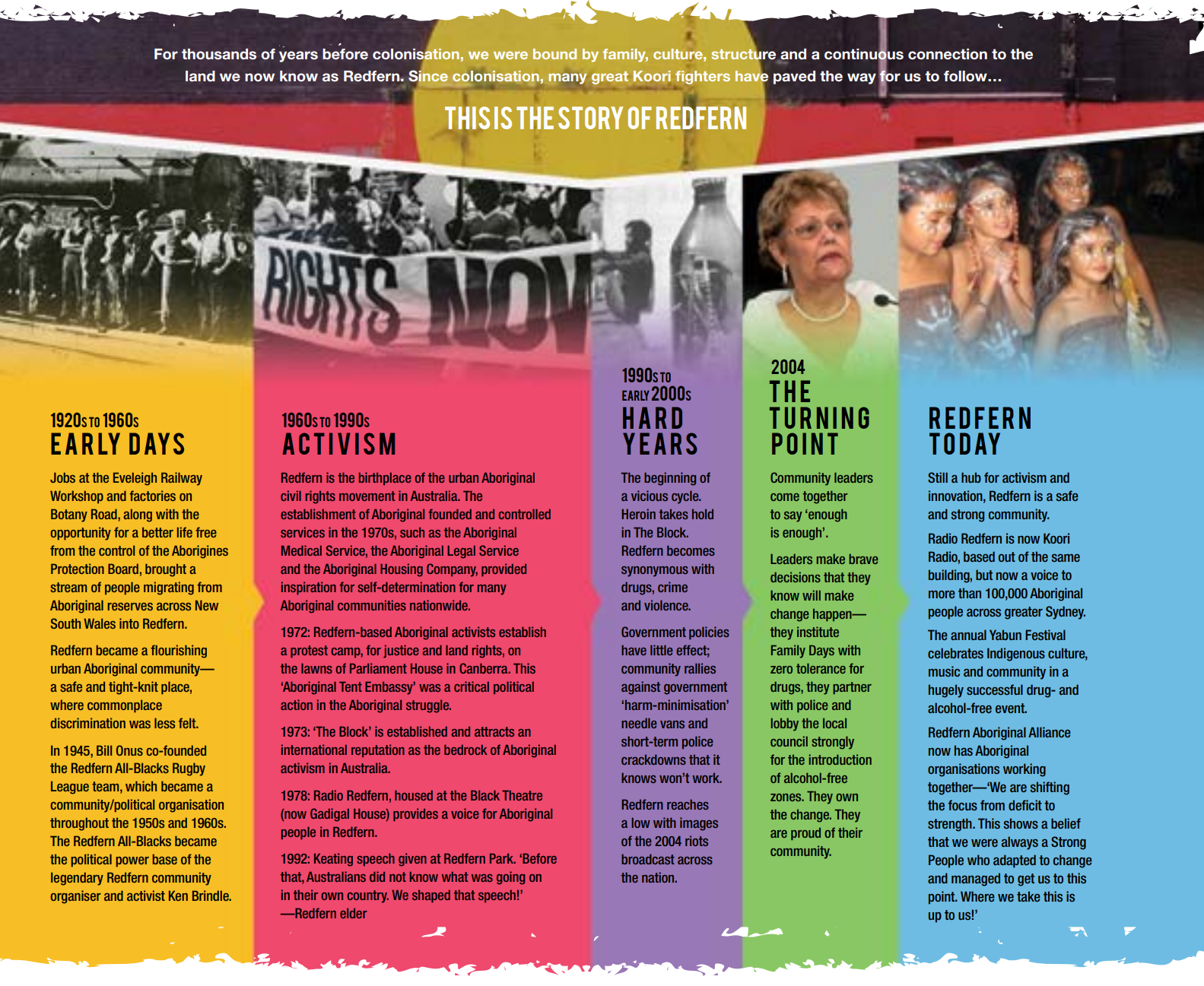Inner Sydney Empowered Communities Limited (ISEC) is one of ten regions leading the Empowered Communities reforms around Australia.
The ISEC Board is made up of equal representation from our two local alliance groups, The La Perouse Aboriginal Alliance and The Redfern Aboriginal Communities Alliance.
This means community priorities are identified at the local level and are taken to the ISEC Board for endorsement.
The ISEC Secretariat supports the ISEC Board and the two local alliance groups. The ISEC Secretariat is neutral convener connecting Aboriginal, government and corporate partners to deliver the regional development agenda.





EIGHT SPECIFIC OBJECTIVES.
aspirations are supported.
between our community and the law.
and have access to quality health care.

Pathway of Empowerment
This report is the culmination of 18 months of engagement and design work by Indigenous leaders, communities and organisations across the eight Empowered Communities regions.
In it, we propose a range of reforms that build on decades of effort by Indigenous peoples to reclaim control in driving our own priorities for development.

The Inner Sydney region
The Inner Sydney region comprises of the two iconic communities of La Perouse and Redfern. Leaders from within the communities have come together through the Empowered Communities initiative to create a united voice to represent their communities.
They share a rich history, which sets the context for their now united vision to come together to pursue new partnerships and ways of working with the broader community, stakeholders and government.
In the first half of the 1900's, Aboriginal people from across New South Wales migrated between Salt Pan Creek, La Perouse and then Redfern in search of work and a better quality of life.
By the 1950's, Redfern was an established Aboriginal community alongside La Perouse and our grandparents travelled to work together on the buses, worked together on the railway and in the factories, and socialised together outside of work.
In 1971, the Redfern All Blacks and La Perouse All Blacks (now La Perouse Panthers) became the founding member clubs of the inaugural New South Wales Aboriginal Rugby League Knockout (known as the Koori Knockout). ‘The Knockout was about family and community, and coming together, it was never just about football’, recalls committee member Bob Morgan.
The 1988 March for Freedom, Justice and Hope is a proud moment writ clear in the minds of many in our communities. La Perouse and Redfern people stood together at Yarra Bay, watching the buses and trucks roll in, For thousands of years before colonisation, we were bound by family, culture, structure and a continuous connection to the land we now know as Redfern. Since colonisation, many great Koori fighters have paved the way for us to follow… as around 20,000 Aboriginal people joined their supporters from the trade unions, the churches, ethnic groups and the wider community. It was a demonstration of survival.
Out of the march came the annual Survival Day Concert, now known and celebrated as the Yabun Festival on 26 January each year. Yabun is the largest one-day Aboriginal and Torres Strait Islander festival, with an audience of between 20,000 and 25,000 people. Now, with the establishment of the Inner Sydney Aboriginal Alliance, we are looking forward to erasing the boundaries and being there together as black fellas, working together to help our community and our people.

-
Connector.
In the first half of the 1900’s, Aboriginal people from across New South Wales migrated between Salt Pan Creek, La Perouse and then Redfern in search of work and a better quality of life.
-
Connector.
By the 1950’s, Redfern was an established Aboriginal community alongside La Perouse and our grandparents travelled to work together on the buses, worked together on the railway and in the factories, and socialised together outside of work.
-
Connector.
In 1971, the Redfern All Blacks and La Perouse All Blacks (now La Perouse Panthers) became the founding member clubs of the inaugural New South Wales Aboriginal Rugby League Knockout (known as the Koori Knockout). ‘The Knockout was about family and community, and coming together, it was never just about football’, recalls committee member Bob Morgan.
-
Connector.
The 1988 March for Freedom, Justice and Hope is a proud moment writ clear in the minds of many in our communities. La Perouse and Redfern people stood together at Yarra Bay, watching the buses and trucks roll in, For thousands of years before colonisation, we were bound by family, culture, structure and a continuous connection to the land we now know as Redfern. Since colonisation, many great Koori fighters have paved the way for us to follow… as around 20,000 Aboriginal people joined their supporters from the trade unions, the churches, ethnic groups and the wider community. It was a demonstration of survival.
Out of the march came the annual Survival Day Concert, now known and celebrated as the Yabun Festival on 26 January each year. Yabun is the largest one-day Aboriginal and Torres Strait Islander festival, with an audience of between 20,000 and 25,000 people. Now, with the establishment of the Inner Sydney Aboriginal Alliance, we are looking forward to erasing the boundaries and being there together as black fellas, working together to help our community and our people.
Our objectives
We have identified eight objectives that emerge from our vision for our communities in the Inner Sydney region
Parents support Education
Parents are supported to be involved in their kids’ education and maintain routines for kids to go to school every day. Schools are welcoming places that provide high-quality education.
Respect
There is a respectful relationship between our community and the law.
Safe Supportive Community
We have a safe, capable and supportive community where our culture is practised and maintained through dancing, singing, language and sharing of knowledge and kinship.
Supported Elders
Elders are supported and cared for by our community.
Capable Adults
Capable adults participate in either training or work.
Supported Young People
Our young people’s aspirations are supported.
Affordable Housing
Housing is affordable and safe, and individuals respect and care for their property and people are supported to achieve home ownership.
Healthy Community
People in our community are healthy and have access to quality health care.
Regional Governance
The structure of the company is based on the relationship with the two community alliance tables, the La Perouse Aboriginal Alliance and the Redfern EC Working Group. The Alliance groups operate in accordance with their respective terms of reference to deliver the shared objectives of Empowered Communities (EC). The Alliance groups comprise organisations that have opted-in to EC and other members as determined by the Alliances. It is at these two tables that the opt-in organisations design their respective community plans and EC priority areas. Opt-in organisations must meet certain eligibility criteria in order to sit at the tables.
Key function of ISEC Ltd.
The secretariat has been established to coordinate the implementation of the Empowered Communities framework for Indigenous empowerment in the Inner Sydney region. It will provide the supporting infrastructure to coordinate work among Empowered Communities partners and drive negotiating and implementing the first priorities and the long-term development agenda for the region.
The secretariat will provide overall strategic coherence and serve as a neutral convener to facilitate effective and robust dialogue between Indigenous stakeholders and between Indigenous, government and corporate partners.
Specific functions of the secretariat include:
Guidance
Guiding the vision and strategy through professional facilitation, administration and secretariat functions
Support
Supporting aligned activity by creating partnerships, collective efforts and increasing collaboration
Establish
Establishing shared and agreed measurement practices and disseminating information
Build
Building community consensus and commitment
Refine
Constantly refining the method by taking an informed developmental approach.
Opt-in Organisations
This refers to registered Aboriginal controlled organisations operating within the ISEC region. They must be actively providing a service which supports any of the eight regional objectives of Empowered Communities.
Empowered Communities aims to;To empower Indigenous individuals and families to achieve economic, social and cultural development
To achieve greater productivity from available resources and opportunities.
Our Board
Shane Phillips
Board Director
Chris Ingrey
Co-Chair
Karen Cooley
Board Director
Millie Ingram
Board Director
Shannon Williams-Baxter
Board Director
Dr Sonya Pearce
Board Director
To be elected
Board Director
To be elected
Board Director
Joint Decision Making
We believe that far greater productivity should be able to be achieved from existing government resources dedicated to Indigenous people in our region. As such we are working in a collaborative way with our partners in government to address the inefficiencies in government spend. Focusing initially on Indigenous Advancement Strategy (IAS) funding.
- A practical step in achieving one part of our empowerment agenda involves the government relinquishing some control over funding decisions, enabling community to have a greater say in where the money goes. To support us achieve this, the Minister for Indigenous Affairs Nigel Scullion has committed to:
- Provide community with a 75% weighting on decisions about IAS specific funding; and
- Transition all funding in the Indigenous Advancement Strategy to Aboriginal Controlled Organisations
Community Panels are the first step in our Joint Decision Making process with government. Non-Indigenous service providers receiving Indigenous specific money through IAS will be reviewed through this process. Community members sitting on the panel will assess these organisations against a set of community led principles of empowerment. Themed tables will review the different IAS project areas.
There are 2 Community Panels and 6 delegates sit on each panel with equal representation from the Redfern and La Perouse communities.
Expression of Interest
Community panel dates will be notified via the Redfern EC Working Group and La Perouse Aboriginal Alliance. An Expression of Interest can be made through the secretaries of the local tables.
Our Board
Shane Phillips
Co-Chair
Shane Phillips is an outstanding community leader and respected spokesperson for Aboriginal Australians. Shane is passionate about the importance of empowering Aboriginal people and is a dedicated contributor to a range of community organisations, he was awarded ‘Australia’s Local Hero 2013’. As the CEO of Tribal Warrior Association and the creator of the Clean Slate Without Prejudice program. His contribution to the empowerment of local Aboriginal men, women and young people knows no bounds, recently leading the first all Aboriginal crew in the Sydney to Hobart yacht race.
He has cultural connections to the Bunjalung, Wonnarua, and Eora peoples.
Shane is the CEO of Tribal Warrior Association and one of the key leaders of the Redfern.
‘Through my work at the Tribal Warrior Association, I have seen the Redfern Aboriginal community make so much progress, and through Inner Sydney Empowered Communities, by working together with La Perouse and getting the right things happening in our communities, together we can build safe, strong, grassroots communities capable of growing and supporting the aspirations; providing opportunities and; creating success for our future generations.”’
Chris Ingrey
Co-Chair
Chris Ingrey is of Dhungutti and Dharawal descent and is from the La Perouse Aboriginal community, Botany Bay. He is also the Chief Executive Officer of the La Perouse Local Aboriginal Land Council (LALC) in Sydney. For the past five years, La Perouse LALC has played a major role in enhancing the community’s governance and leadership, with a focus on engaging young people. Chris has led significant reforms to the governance of
the La Perouse Aboriginal community. This has included developing the Empowered Communities initiative and restructuring the La Perouse Aboriginal Alliance Group to better suit the needs of the community.
Chris was previously employed in the NSW Government’s Environmental Department and at Qantas.
“Through Inner Sydney Empowered Communities, we have the space to sit down and shape what our futures will be, and to push and develop the projects we know will strengthen our communities. We are planning for what we want our community to look like in 20 years’ time, something we have never done before, and that is exciting. This exhausting work is not about us of today, it’s for the next generation and the many more to come.”
Karen Cooley
Board Director
Karen Cooley is a proud Aboriginal Woman from the La Perouse Community. Karen has a 16-year long career working with the Guriwal Aboriginal Corporation, serving for the past 9 years Karen as the Manager. Guriwal provides aged care services to the elders in the community. Guriwal is leading the aged care agenda for the community, currently progressing a feasibility study for an aged care facility in La Perouse community.
Prior to working in the community, Karen worked in various Government Departments, but her passion has always been to work in her own community for her own people.
Millie Ingram
Board Director
Millie Ingram was born and raised in Wiradjuri country (Cowra) in central NSW. Millie has worked in Aboriginal Affairs all her life at a community level and in government. For 13 years from 1982, Millie worked for the Department of Aboriginal Affairs as Assistant Secretary advising the government on community relations and partnerships.
Millie was an elected Councillor for the NSW Aboriginal Land Council for four years representing the Wiradjuri Region of NSW, being the only woman popularly elected by the community on a council of 13 people. In 2011 Millie received a Commonwealth Bicentenary Award from then Prime Minister, The Right Hon. John Howard, the services to the community.
Millie is a Justice of the Peace and was a finalist in the NSW 2010 International Woman of the Year Award which was celebrated on 8th March 2010. She was awarded ‘Woman of the Year’ in 2010 for the electorate of Heffron, held by the Hon. Kristina Keneally MP. Currently, Millie is a board member with Inner Sydney Empowered Communities Ltd.
Shannon Williams
Board Director
Shannon Williams is the administrator at Eastern Zone Gujaga Macs. “Gujaga” is the Multipurpose Aboriginal Childcare Service for La Perouse. Gujaga has supported the early education of Aboriginal children for over 20 years and plays an important role supporting the ‘Bummers’ Youth Haven and the Hippy Program (parent’s homework program). Prior to joining Gujaga Shannon worked for the Women’s Legal Service NSW where she was the Senior Officer for the Indigenous Women’s Legal Program.
Dr Sonya Pearce
Board Director
Dr Sonya Pearce is a Gooreng Gooreng women who is now Honorary Research Associate and formerly, Senior Lecturer/Director of Indigenous Programs at the UTS Business School, Sydney, where she received her PhD in Indigenous Women Entrepreneurship. Sonya now works with Tranby Aboriginal College, Australia’s oldest established Indigenous adult learning centre. Here she works in the space improving engagement and education. Her academic work has been highly awarded, including an ARC grant, a UTS Teaching and Learning Award, and a Carrick Citation for Outstanding Contribution to Student Learning. Sonya’s work on tackling violence in Aboriginal communities was recognised with a UTS Human Rights Award and presented to the United Nations Committee of Women. Her formal qualifications include:
PhD (Management), M. Ed (Adult Education), B. Ed (Adult Education), Dip. Adult Ed (Aboriginal), Cert IV Training and Assessment.
“I support the Empowered Communities model as it gives a voice to community people and their representative organisations. It also provides a platform for the development of individual and joint development of initiatives for Indigenous people”.



 Protected by Patchstack
Protected by Patchstack